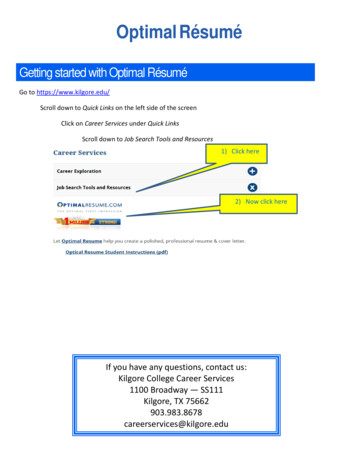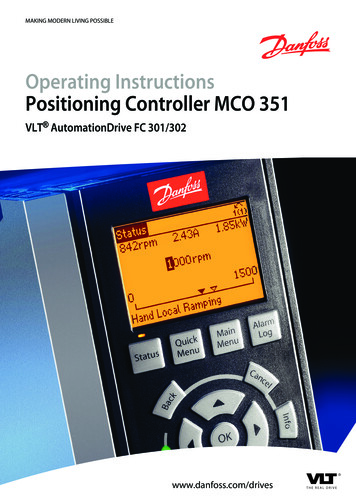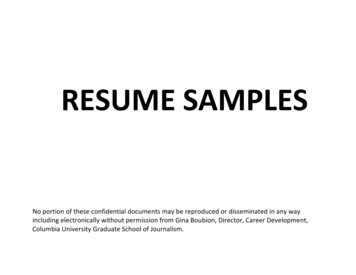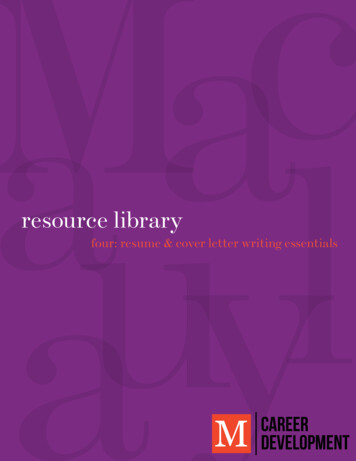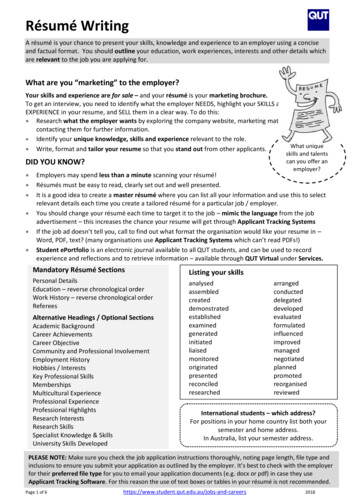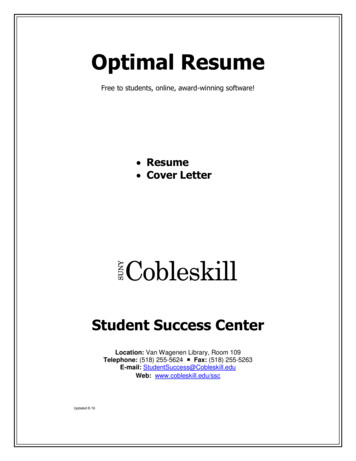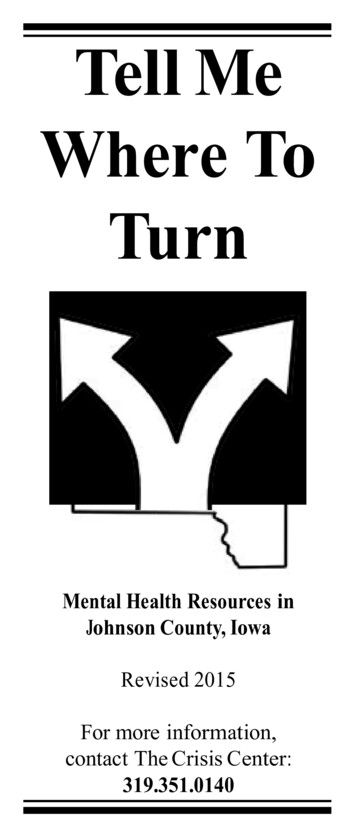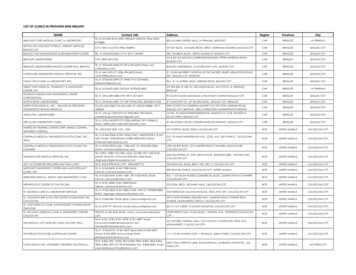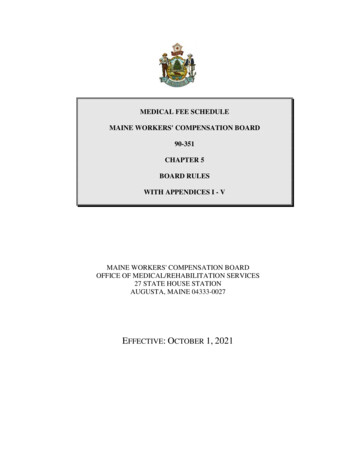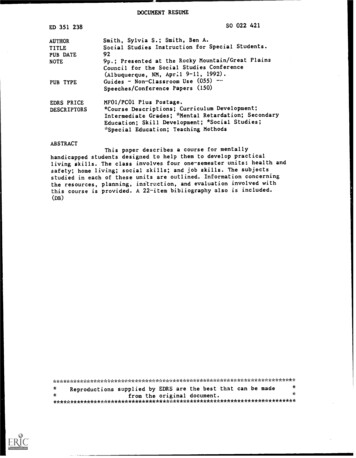
Transcription
DOCUMENT RESUMEED 351 238AUTHORTITLEPUB DATENOTEPUB TYPEEDRS PRICEDESCRIPTORSSO 022 421Smith, Sylvia S.; Smith, Ben A.Social Studies Instruction for Special Students.929p.; Presented at the Rocky Mountain/Great PlainsCouncil for the Social Studies Conference(Albuquerque, NM, April 9-11, 1992).Non-Classroom Use (055)GuidesSpeeches/Conference Papers (150)MF01/PC01 Plus Postage.*Course Descriptions; Curriculum Development;Intermediate Grades; *Mental Retardation; SecondaryEducation; Skill Development; *Social Studies;*Special Education; Teaching MethodsABSTRACTThis paper describes a course for mentallyhandicapped students designed to help them to develop practicalliving skills. The class involves four one-semester units: health andsafety; home living; social skills; and job skills. The subjectsstudied in each of these units are outlined. Information concerningthe resources, planning, instruction, and evaluation involved withthis course is provided. A 22-item bibliography also is **********************************Reproductions supplied by EDRS are the best that can be madefrom the original ******************************
Social Studies Instruction for Special StudentsU.S. DEPARTMENT OF EDUCATIONOffice of Educational Research and ImprovementEDUCATIONAL RESOURCES INFORMATION)tcCENTER tERIC)This document has been reproduced asceived from the person or organizationoriginating itC Minor changes have been made to improvereproduction qualityPoints of view or opinions stated in this document do not necessarily represent officialOERI position or policy"PERMISSION TO REPRODUCE THISMATERIAL HAS BEEN GRANTED BYSL{L-U o'vSW\ \TVsTO THE EDUCATIONAL RESOURCESINFORMATION CENTER (ERIC)."Sylvia S. Smith, Manhattan High School, KSBen A. Smith, Kansas State UniversityRocky Mountain/Great Plains Council for the SocialStudies ConferenceAlbuquerque, New MexicoApril 9-11, 19922BEST COPY AVAILABLE
Social Science Discipline/Issue: Civics, Economics, SociologyGrads Laval: Middle and High SchoolLIFE SKILLS CLASS FOR SPECIAL STUDENTSThe Life Skills course was organized after the parent of an Educable MentallyHandicapped (EMH) student asked about help for their child in the area of developingpractical living skills. The course is offered each semester for special educationstudents. There are four different, one semester, units. The class is planned withthree goals in mind: the development of practical daily living skills; the implementationof skills training through hands on and participation instruction; and the developmentof students' study guides which later serve them as a reference. Basic skills, such asreading, writing, and problem solving are included in the planning. Littl!, objectiveevaluation is used. Most evaluation is done by the teachers' observation of thestudents daily participation. Each semester is different and gives the student 1/2credit in Social Studies. Each semesters unit is divided into 8 to 10 related topics ofstudy of aspects of living in the community. A limit of 10 students was set for the class.At present there are seven from the EMH class, two from Continuing Education(students at risk), and one Learning Disable student.The four semesters have been planned and taught. Contents of the Life Skillscourse can be found at the conclusion of this paper.ResourcesIn order to cover topics which have been addressed in these units a great dealof research has been done. There are many places from which to draw:1. School, public, and university libraries2. Home Economic, health, and learning disabilitiesdepartment in schools3. Public Health Department4. Free materials and audio visual aids companies5. Local businesses6. Commercial books7. Fellow teachersPlanningEach unit of study is planned for a 2 week or so period of time, depending onthe subject and interest of the class. Instructions regarding what is to beaccomplished are given. Some teaching techniques being used are lecture, reading,class discussion, guest speakers, video tapes, filmstrips, and film. The following wayscan be used to help students apply, develop, review, and evaluate their efforts:1. Lecture using charts and overhead transparencies(to gain basic information)2. Large group discussion(for questions and evaluation)3. Role play(to apply learning)4. Brainstorming3
(to be creative)5. Commercial games(to review information)6. Word mazes(to review)7. Crossword puzzles(to review)InstructionStudents with various ability levels are involved, so lesson plans must be adapted tosuit their individual needs. Peer tutoring, the "buddy system", is used to aid studentswho need individual help. A variety of activities is chosen to encourage activeparticipation. Use of as many audio visuals as possible is employed, because manyof these students require representative samples that are concrete. The use of thistype of material seems to increase the students ability to comprehend the material.Communication is the key to a successful class of this type. The way youcommunicate can effect your ability to build a good relationship with students. Hereare some ideas to remember as you communicate with special students:1. Watch body language2. Use a warm tone of voice3. Listen to students4. Make questions open ended5. Avoid starting questions with "why"6. Reflect the feeling you hear from the students7. Be human8. Confront a student directly if there is a discrepancy in what they are sayingEvaluationEvaluation can be done in many ways. Some tests and quizzes are given, which thestudents sometimes check themselves or may be checked by peers. A rating scalecan be helpful, in that way a continuous observation of the student can be compiled.At present, a daily rating scale of 1-4 is used, 4 being good participation. Studentsshould be helped to formulate a plan to solve problems, make sure it is the studentsplan and not yours. Teachers should try and help students to solve problems andplan for alternatives.
Life SkillsIHealth and SafetyUnit 1 Self-concept and values clarificationUnit 2 Personal hygieneA. Learning about selfB. Good healthC. GroomingUnit 3 Physical fitnessA. ExerciseB. Eating rightUnit 4 Proper dressA. InformalB. FormalC. WorkUnit 5 Basic first aidA. DangersB. EmergendesC. Home needsUnit 6 Drug educationA. LegalB. IllegalUnit 7 AbuseUnit 8 Sex education
Life Skills II Home LivingUnit 1 EconomicsA. Monthly billsB. BudgetingC. RentD. UtilitiesUnit 2 Auto upkeepA. PaymentsB. UpkeepC. InsuranceUnit 3 ShoppingA. ClothingB. FoodC. House hold goodsUnit 4 Home upkeepA. CleaningB. RepairsC. FurnishingUnit 5 Home SafetyA. ElectricityB. FurnaceC. CookingD. FirearmsUnit 6 Personal MaintenanceA. Washing clothesB. IroningC. MendingUnit 7 CookingA. ShoppingB. EquipmentC. TerminologyD. Simple cooking6
Life Skills Ill Social SkillsUnit 1 Self-concept/self esteemUnit 2 FeelingsA. Praise (giving and taking)B. CriticismC. PrejudiceD. StressUnit 3 MannersA. PersonalB. HomeC. WorkUnit 4 Time managementA. Day to dayB. AppointmentsC. WorkUnit 5 DatingA. RolesB. RulesUnit 6 MarriageA. PlanningB. FinancingC. LawsUnit 7 Family RolesA. Husband/wifeB. ParentingUnit 8 LawA. PersonalB. CommunityC. EmploymentUnit 9 Recreation7
Life Skills IV Job skillsUnit 1 EmploymentA. SourcesB. ApplicationsC. InterviewsUnit 2 IncomeA. PaycheckB. Fringe benefitsUnit 3 MoneyUnit 4 BankingA. Checking accountB. Savings accountUnit 5 InsuranceA. LifeB. HealthC. CarD. HomeUnit 6 TaxesA IncomeB. StateC. PropertyUnit 7 RegistrationA. VotingB. Selective serviceUnit 8 RetirementA. Social securityB. Investments8
Bbliography1-1'-aAbendroth, R.B. (1986).Holland, III.: Goodheart-Willcox Co. Inc.II-0-Ament, K., & Reitt, F.M. (1971). Steps in Home Living. Peoria,ui .SouthBennett Pub. Co.Chamberlain, V.M., & Eubanks, E. (1984). personal Skills: for Home. School. and Work. Peoria, III.:Bennett Pub. Co.Ha {chin, L.C. (1976). Home Economics jgrjeamemffith Special Needs. Mansfield, Pa.: HomeEconomics Dept. Mansfield State College.Henke-Konopasek, N. (1989). Building Life Skills. South Holland, III.: Wilcox Co. Inc.House, D. Mc., & Turnbow, G.N. (1990). On My Own at Home. East Moline, Ill.: Unjui Systems, Inc.Hudson, M.W., & Weaver, A.A. (1965). QaThfann. Phoenix, N.Y.: Frank E. RichardsPub.Kelly, J.M., & Chamberlain, V.M. (1980). Survival a Guide to Uving.nnYour ram New York: McGraw-HillBook Co.Kimbrell, G., & Vineyard, B.S. (1989). Entering the World of Wok Mission Hills, CA: Glencoe/McGraw-Hill.Kinnison, L.R., & Hatcher, C.J. (1990).PA: Cjhalcher & Associates Inc.I .11-1.Chester Springs,Liddell, L.A. (1989). Building Life Skills. South Holland, Ill.: Goodheart-Willcox Coinc.Owen, M.A. (1987). Economics 2 The System in Action. Castro Valley, CA: Overces Corp.Prevo, H. (1967). Family Life. Book I &II. Phoenix, N.Y.: Frank E. Richards Pub. Co. Inc.Prevo, H. (1979). Manners. Phoenix, N.Y.: Frank E. Richards Co. Inc.Schmelzei, C.R. (1986). Learning to Get Organized. Fort Atkinson, WI: Nesco.Schneider, B. (1974). Getting & Holding a Jot. Phoenix, N.Y.: Frank E. Richards Co. Inc.Simon, S.B. , & Carl, J. (1975). Beginning Values Clarification Strategies for the Classroom. San Diego,CA: Pennant Press.Simon, S.B., Leland, W.H., & Kirschenbaum, H. (1972). Values Clarification. N.Y.: Hart Pub. Co. Inc.Stiefei, B. (1987). On My Own With Language. Moline, Ill.: Linjui Systems, Inc.Turner, R.H. (1974). The Friends You Make. N.Y.: Follett Pub. Co.Turner, R.H. (1974). The Person You Are. N.Y.: Follett Pub. Co.Woal, J.D. (1977). Preparing for the Job Interview. N.Y.: Frank E. Richards Pub. Co. Inc.
DOCUMENT RESUME ED 351 238 SO 022 421 AUTHOR Smith, Sylvia S.; Smith, Ben A. TITLE Social Studies Instruction for Special Students. PUB DATE 92 NOTE 9p.; Presented at the Rocky Mountain/Great Plains
